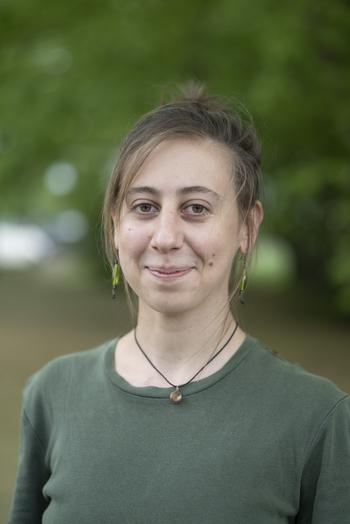Elsa Canali

PhD Candidate
Literature
Project: "The Archivist of the Future: Roberto Bolaño and Liminal Strategies in the Literary Staging of 'Ex-Centric' Artists"
14195
Education
| Since 05/2025 | PhD Candidate, International Research Training Group "Temporalities of Future", Freie Universität Berlin |
| 04/2023 - 06/2023 | DAAD Research Grant
(Forschungsstipendien für Doktorandinnen und Doktoranden 2023) |
|
05/2022 - 02/2024 |
Fellow of the Dr. Möllenkamp Stiftung für Lateinamerikanische Literatur |
| Desde 2022 | PhD in Literatures and Cultures of Latin America, Freie Universität Berlin |
| 2018- 2021 | Master in General and Comparative Literature, Freie Universität Berlin |
| 2015-2017 | Bachelor in German-Italian Bilateral Studies, Rheinische Friedrich-Wilhelms-Universität Bonn |
| 2013-2015 | Bachelor in German-Italian Bilateral Studies, Università degli Studi di Firenze |
Work experience
| 04/2023 - 08/2023 | Centro de Documentación Arkheia, (MUAC), Mexico City (Mexico) - Cataloguing work of the manuscripts in the archive of Alcira Soust Scaffo - DAAD Research scholarship for PhD candidates |
| Since 2022 | Blog: Alcira Soust Scaffo - Transcriptions of part of Alcira Soust Scaffo's poetic manuscripts and publication of video-audio interviews |
|
18 -19 October 2023 |
Academic Talk: “ Prácticas re/esistentes: Reflexiones sobre la vida y obra de Alcira Soust Scaffo y sobre Auxilio Lacouture en la novela Amuleto de Roberto Bolaño”. Jornadas Homenaje Roberto Bolaño (2003-2023): Diálogo de lectores. ILH-MALBA - Buenos Aires |
Project: The Archivist of the Future: Roberto Bolaño and Liminal Strategies in the Literary Staging of “Ex-Centric” Artists
Supervisor: Prof. Dr. Susanne Klengel, Freie Universität Berlin
The Chilean writer Roberto Bolaño (1953–2003) is not only a central figure in Latin American literature but also belongs to the realm of world literature. In July 2024, The New York Times included two of his books in the list of the 100 best of the 21st century, reaffirming the global relevance of his work. According to my hypothesis, his distinctive narrative style functions as an unusual “archival strategy” by assembling multiple marginalized voices and perspectives. My research project aims to interpret Bolaño’s work as an archive.
What does it mean for a writer not only to create stories but also to construct archives within his work? Can we consider Bolaño, beyond being an author, reader, and librarian, as an “archivist of the future”? This question guides my doctoral project, which focuses on five real-life “ex-centric” artists who appear as characters in his work and have received little recognition in literary history: the Uruguayan activist and poet Alcira Soust Scaffo, the Mexican poet Mario Santiago Papasquiaro, the Chilean-German trans* multidisciplinary artist Lorenza Böttner, and the Polish writer and illustrator Bruno Schulz.
My study proposes the need for an "archival turn" in the reception of Bolaño, based on a rereading of his work from the perspective of the future. I focus on identifying marginalized artists who have been excluded from literary history. In this context, the precarious empirical archives of these figures will be located, analyzed, and compared with their literary representations in Bolaño’s work. The aim is to read his work as a “fictional archive” that, far from being a mere reflection of the past, contains traces of precarious poetic and literary realities that persist over time. Finally, my research highlights the importance of making silenced literary voices visible and emphasizes Bolaño’s ethical commitment to projecting them toward the future through his literary archive.


